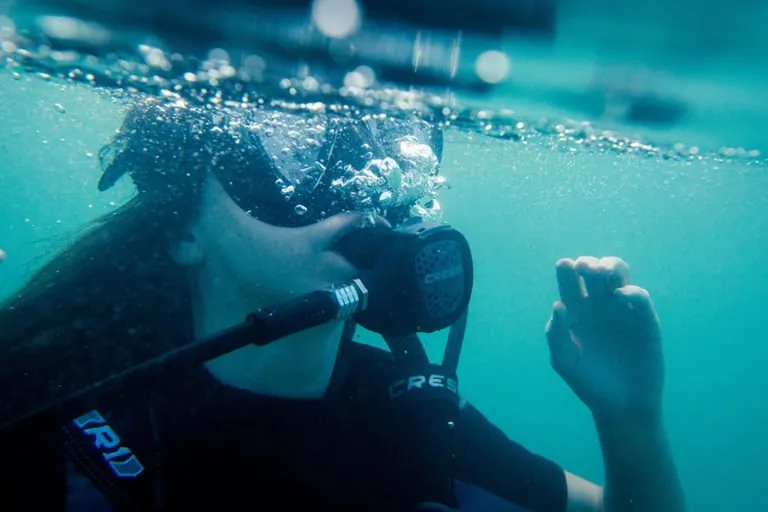From Beginner to Expert: Diving Levels Explained

When you’re searching for your next dive, chances are, you’ll need to indicate your level of dive skill. If it’s your first time, the answer is obvious. But beyond that, how do you know which box to check? We’ve laid it out for you.
WHAT ARE THE DIFFERENT DIVING LEVELS?
If you had to guess, you’d probably think your level depends on the number of dives you’ve taken. Sorry, but wrong answer. It’s all about your skill level.
Think about it: If you don’t have basic control over yourself and your equipment, you can’t be expected to deep dive. It’s what separates a beginner from an expert.

BEGINNER
As a beginner, you’re still getting your feet wet (pun intended). You’re getting the hang of buoyancy control and have an understanding of different finning techniques (frog kick, helicopter turn, reverse fin, etc.), but you haven’t mastered any yet.
When coming across tense situations, you’re unsure of how to react. You may not realize you’re finning out of control and your breathing becomes heavy, which can cause panic.
Give yourself a break and remember that you’re just getting started—you don’t need to have it all figured out on your first dive. Remember, to get to expert level, you don’t need to dive every day, you just need to master the techniques.

INTERMEDIATE
To be considered an intermediate diver, you need to know how to adjust your breathing and can hover without flailing. You should always be aware of your surroundings and be able to get from point A to point B with consistency and haste.
To expand your horizons as an intermediate diver, it’s best to get acquainted with other types of water and situations—freshwater, salt water, and low visibility surroundings.
Scuba diving isn’t only a physical sport, it’s also a mental sport. Since you’re completely submerged underwater, it can be hard to get your bearings.There’s a chance you’ll become confused, and in extreme cases, panicked.
After having some experiences with different circumstances under your belt, you’ll conquer new water and explore places seen by few—all while keeping a level head.

ADVANCED
For those who know their way around an ocean, they’re of the advanced class. They traverse waters like they traverse roads—fluid, stable, and in control. Knowing their surroundings and being aware helps to build navigational skills.
Advanced divers can adjust their breathing when ascending so they don’t suffer from decompression sickness. This happens when divers ascend too quickly without completing decompression stops. It’s a scary thing to happen when you’re coming from deep water.
When stressful situations arise, advanced divers remain calm, remember their training, and carry on. They also take care of their equipment and equally rely on it to know they’re safe the entire time of their dive.
As part of their skill, they know different fin kicks and when to apply them to keep balance. Navigating the waters becomes second nature—it’s as easy as walking.

EXPERT
What separates the advanced level from the expert level? Experience and ambition. It’s one thing to scuba dive in different oceans. It’s another to go off the beaten path to try various adventure dives. Experts go out of their way to conquer new waters and conditions, such as caves and caverns.
With this kind of experience, a once beginner diver can become an instructor who teaches other eager divers. But not without achieving certification.
WHAT ARE THE DIFFERENT CERTIFICATION LEVELS?
Before you can get to expert status, all aspiring divers need to be certified. Certification classes teach all the basics of scuba diving, while also preparing advanced scuba divers for more technically challenging dives.
There are multiple agencies that offer different levels of scuba diving certification. Small differences exist in the course content between agencies (especially how courses are named), but they generally all offer the same type of courses. Check out each agency’s website for the full details on their course offerings.
6 OF THE MOST POPULAR CERTIFICATION ORGANIZATIONS:
- PADI | THE PROFESSIONAL ASSOCIATION OF DIVING INSTRUCTORS
- PADI offers recreational and some technical training
- Entry-level course is called PADI Open Water Diver
- SSI | SCUBA SCHOOL INTERNATIONAL
- SSI offers recreational and technical dive training
- Entry-level course is called SSI Open Water Diver
- NAUI | THE NATIONAL ASSOCIATION OF UNDERWATER INSTRUCTORS
- NAUI is a non-profit training organization that offers both recreational and technical dive training
- Entry-level course is called NAUI Scuba Diver
- BSAC | THE BRITISH SUB-AQUA CLUB
- BSAC has five internationally-recognized diver grades
- Entry-level course is called Ocean Diver
- SDI | SCUBA DIVING INTERNATIONAL
- Entry-level course is called SDI Open Water Scuba Diver
- RAID | THE REBREATHER ASSOCIATION OF INTERNATIONAL DIVERS
- RAID has over 60 programs online
- Entry-level course is called RAID Open Water 20
DISCOVER SCUBA
If you’re thinking about scuba diving for the first time, consider taking this quick introduction to explore underwater. It is not an official certification course, but it let’s you get your feet wet before becoming officially certified. PADI dive shops offer this program either in a pool, or in the shallow water off a beach before a scuba dive. Find out more here (https://www.padi.com/courses/discover-scuba-diving).
OPEN WATER DIVER CERTIFICATION
Before diving head-first into any body of water, every aspiring diver needs to obtain the open water diver certification. It allows you to dive down to 60 feet nearly anywhere, as long as you’re accompanied by a fellow diver with the same level or higher certification. There are three phases to the Open Water certification, which include knowledge development with eLearning, skills development with confined diving (usually in a pool), and practical skills in the open water.
There are classes to take either in-person or online that go over the basic principles of diving. You’ll learn how the gear works and feels and what challenges you’ll face in the water so you can have a safe first dive. Read more details on the Open Water course here (https://searchscuba.com/blog/post/padi-open-water-diver-certification).
ADVANCED OPEN WATER DIVER CERTIFICATION
PADI and SSI offer this level of training under this title, while other agencies offer similar training under different titles. Advanced Open Water Diver is a step up from the entry level certification (often referred to as Open Water Diver). You don’t need to be “advanced” to take it. The point of this course is to advance your knowledge, skills, and confidence underwater so that you can become more advanced with the training.
The Advanced Open Water Diver certification requires an entry-level certification and a required number of logged dives (this varies between agencies). For example, SSI requires 24 logged dives, while PADI requires 5 dives on course.
After completion, you’re able to dive down to 100 feet (30 meters).
RESUCE DIVER
Rescue Diver scuba certification focuses on emergency response and diver rescue and is the third level of qualification for scuba divers. This course is offered by several training agencies (PADI, SSI, SDI, and NAUI). The certification level is similar to the BSAC Sports Diver, although the European courses are often more intensive than the U.S. agencies.
Most agencies require that the diver is at least 15 years or older to enroll in this level of certification, while others require a diver to be 18 years old. The Rescue Diver course prepares you to prevent and manage dive emergencies underwater, while mastering your own scuba knowledge and skills.
MASTER SCUAB DIVER
The Master Scuba Diver certification is offered by NAUI, PADI, SDI, and SSI. Other agencies offer this program, but again under different names. Each agency has different requirements in order to enroll for this certification, so be sure to check each one for the specific details. The course typically covers topics from theory to methods to supervising students and certified divers. This is the most advanced scuba diver level and very few master it.
OTHER CERTIFICATION TYPES
Looking to make a career out of scuba diving? Or experience everything diving has to offer? There are lots of paths you can take—everything from rescue diving to underwater photography.
Other certification types include (but not limited to):
- Boat Diving
- Coral Reef Conservation
- Drift Diver
- Ice Diver
Each comes with their own courses you’ll need to complete to earn certification.
GET YOUR DIVE ON
Remember, the number of dives doesn’t determine your level. With patience, practice, and determination, you’ll go from beginner to expert by focusing on improving your skill.
